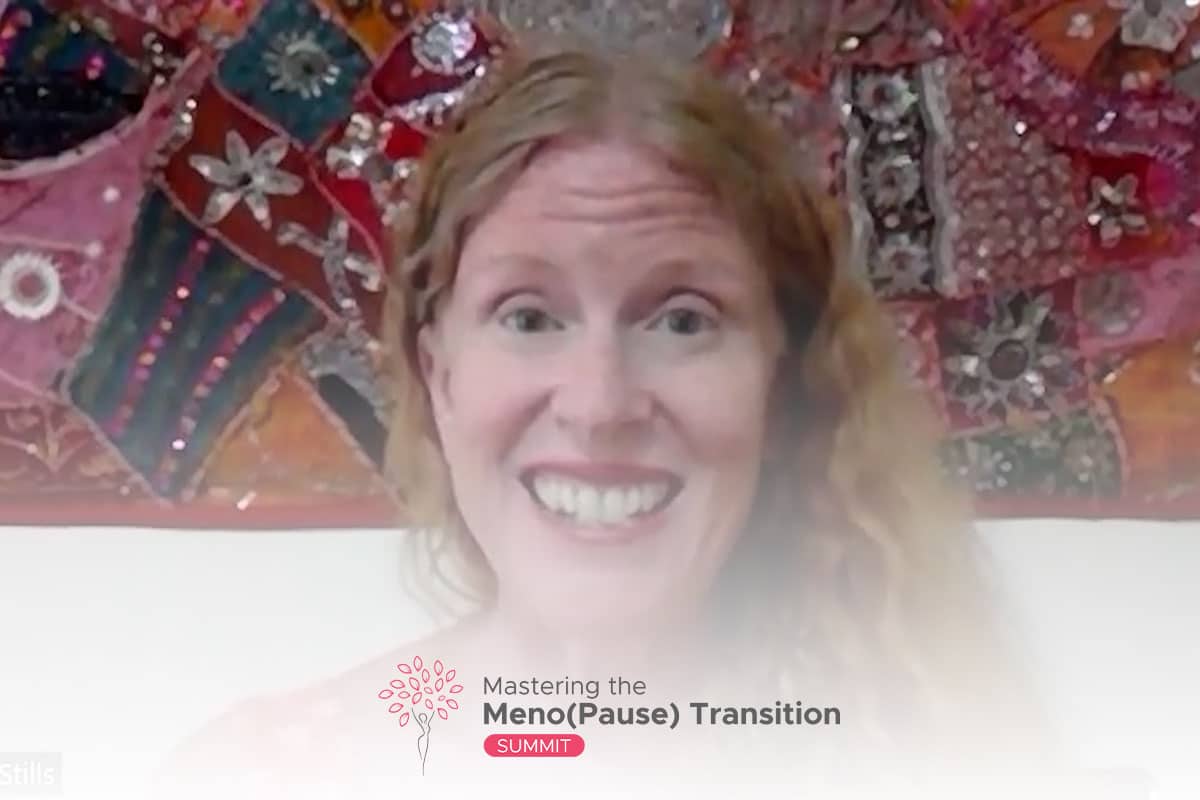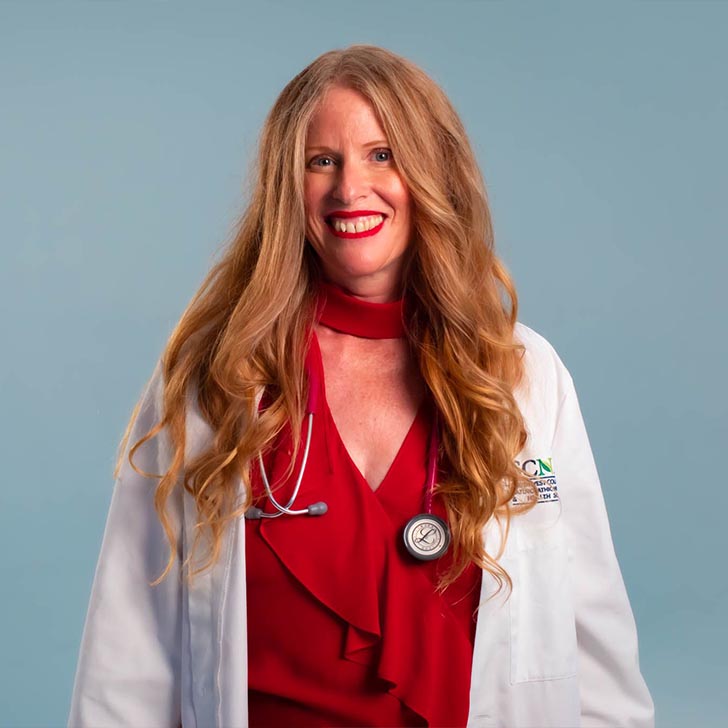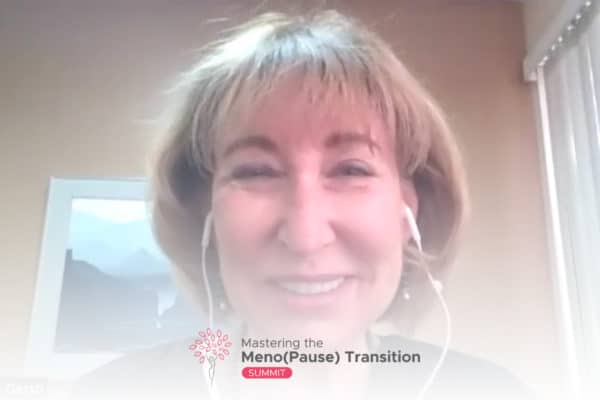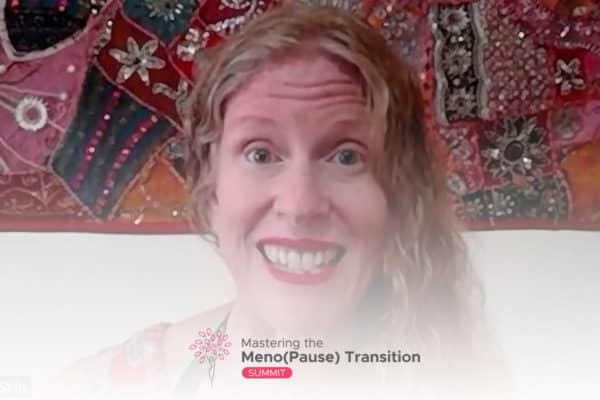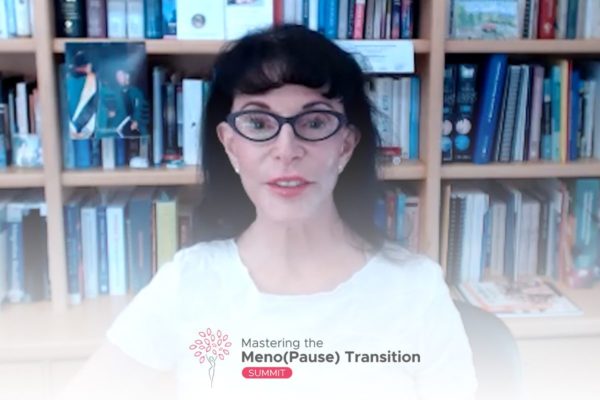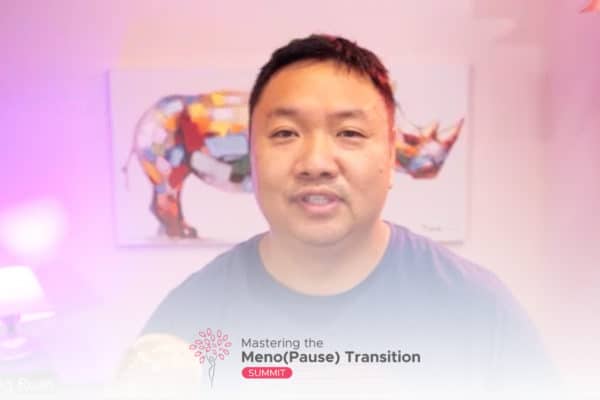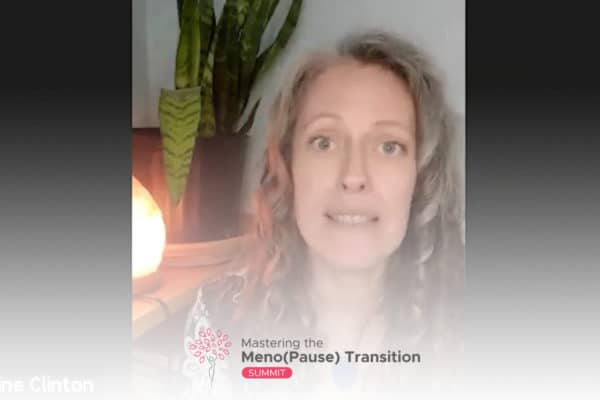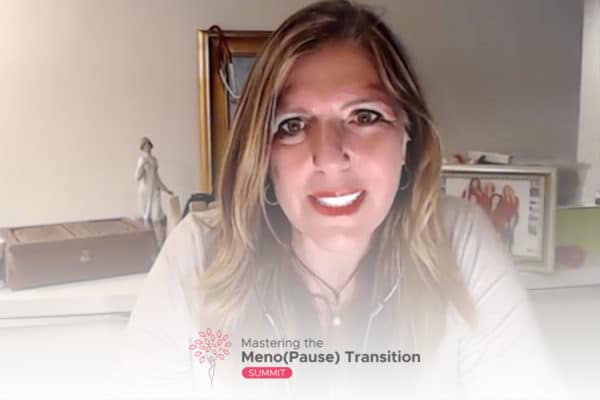So some of the things that I have found are stress. Stress is 99.999% a contributing factor of all illness. And we’re gonna talk more about stress tomorrow in my little class for you. But what I can tell you is often your cortisol levels are raging in the evening when they should be the lowest. And so there’s a disconnect between your hypothalamic, pituitary, adrenal axis. And so by calming that cortisol, and often phosphatidylserine or melatonin, ashwagandha, theanine, magnesium. These are some supplements I’ll use. And let’s not forget about progesterone. If you are low in progesterone, oral progesterone, because it crosses the blood-brain barrier and has a GABA-like effect, which is an inhibitory neurotransmitter, can be total game changers. But it’s important to do a saliva test and see, is your cortisol spiking at night? It’s really important around my life and my world and my patients.
We test. We don’t guess. Because you really never know what’s going on until you see the data. So for example, you can try some phosphatidylserine, but it’s much better to really do the testing and see if it is a cortisol issue, or is it a progesterone issue? And so that’s one of the bigger reasons I see especially women not falling asleep. Now, sometimes my patients fall asleep, but then can you relate, they’re up every night, like clockwork. Hello, clock, it’s now 2 a.m., and here I am, bright-eyed and bushy-tailed when I should be sleeping. Very frustrating, and so often when that happens, when we can fall asleep easily but we don’t stay asleep, that means our adrenals are depleted. We have what’s known as low cortisol or hypoadrenia. And so we’re waking up in the middle of the night. Often it’s also a blood sugar issue that wakes us up. And so the treatment then becomes very different. We have to support and nourish the adrenal glands. We also need to be thinking about, are we waking up at the same time every night? And what time is it? Because if you’re waking up at that 2 a.m., that is right smack in the dab middle of the liver energy. In traditional Chinese medicine there’s something called the cycle of tides, and each organ has a two-hour period where it is being highlighted, where it’s being focused on, where the energy is running higher.
And so if you’re constantly waking up between 1 and 3 a.m. in the morning, and that’s the time of the liver, then we need to be thinking about your liver. Not that we shouldn’t always be thinking about your liver, because the liver is so important in hormone metabolism and detoxification, and the over 500 things that the liver does. And so it’s always important that we be supporting liver. I didn’t mention this in depth, but when I was talking about bioidentical hormones back in day two, I was talking about how I make my patients do certain things or they don’t get their hormones refilled, and liver support, if you’re on hormones, you’re on liver support. There’s end of conversation. I’m like Mother. You have to do this. And it’s for your own safety and for your body’s health. Okay, so back to sleep. So you wanna think about what time you’re waking up, because there could be a clue in there as to an organ system that needs some more TLC.
You want to be thinking about, is it hard to fall asleep, hard to stay asleep? Are you waking up refreshed? Do you wake up with headaches that go away as the day goes on? If that is the case, that’s a sign that there is a low thyroid issue going on. So how are you feeling when you wake up? Are you waking up because of an alarm clock, or are you waking up on your own? So one of the things I wish for you is that you can wake up before your alarm clock. And so let me just tell you a quick story about a very special patient, myself. When I was in naturopathic medical school, I was a single mom, I was going through school. I had the two boys, they were about 8 and 10 at the time. There was a lot going on in my world. So even though I’m at a different stage now, I can relate to any of you who have a ton going on. And so I always back then knew how important self-care was. And back then, I had to pick and choose. I had to find my non-negotiables. And sleep has always been a non-negotiable.
So has meditating, and so has exercising. Back then, those were like my three. I had to move my body, I had to meditate my brain, and I had to get enough sleep. And so I used to go meditate around the corner. There just happened to be a Zen monk living in my neighborhood. Sometimes the universe is just like, here, we will support you and put a Zen monk in your backyard. And the meditation times were early, which was good, because I had to get up early to get the kids off to school. So I was going over there meditating at like 5 a.m. in the morning. And that didn’t mean that I was still staying up till 10:30 because that wouldn’t be enough sleep for me, 10:30 to 4:30. That’s six hours, and I’m a firm believer that eight hours is that golden number of hours that serves us all very well. There may be a little fluctuation. Some may need a little less, some a little more. But I really find eight hours is the sweet spot. I’ve seen this time and time again with patients where if I can just get them from seven to eight, it’s like, ta-da, they just feel so much better, they have more energy, more clarity, et cetera, et cetera.
So anyway, so because I was getting up and going over there early, I went to sleep earlier. I used to go to bed at 8:30. So I would go to sleep at 8:30, and I would get up at 4:30, and that’s how I would get my eight hours. And that meant maybe I wasn’t watching my favorite show, or maybe I wasn’t getting all the dishes cleaned. This was before computers, so I didn’t have to worry about emails or checking Facebook or anything like that. This was over 20 years ago. But there were still things going through the mail, whatever it was, making sure the kids’ homework was done. And so I just made sure that all happened, so by 8:30, I was sleeping. And if you want to get those eight hours’ sleep, then that doesn’t mean you lie down at 8:30. You have to give your body some time to chill out, relax. So the bedtime ritual starts at 8 if you want to be sleeping by 8:30. And so what occurs in those bedtime rituals? And so anyway, I tell you that story just to point out that we have to prioritize our sleep.
So if you have to get up early, if you have responsibilities, it just means you go to bed earlier. And it means you take an inventory of your life and how you are spending your time. And we begin to prioritize the things that feed us and fuel us, and sleep is one of those things. So what are some of the things that you can do to get ready for sleep? You can turn off your computers and turn off the emails and stop looking at blue lights. Or if you’re gonna look at blue lights, I don’t have my glasses right here, but put on your blue blockers so you’re not getting that blue light in and suppressing melatonin production. You can make sure your room is cool. And we had the chilly pad talk. And so get a chilly pad, get chilly. It helps you sleep. Make sure that your temperature, your thermometer is down. But I’m really excited about the chilly pad, because after talking with Tara and realizing just because you set the temperature down doesn’t mean that your whole body’s gonna cool down, I am like chilly pad queen now. You want to make sure your room is dark. And so some of you may wear an eye mask, which is fantastic, but that doesn’t mean that your skin, which has receptors and takes in the light as well, is gonna be protected. And so really important to make the room dark. If you have to buy blackout shades, do whatever it is, cover up, like when I go to a hotel and they have like those flashing lights, I cover everything, whether it be with a bunch of towels or electrical tape. But you want that room to be dark so when you put your hand in front of your face, you can’t see it. That is going to be a huge gift to yourself. I think it’s really important. You have to think about why are you waking up? Are you waking up and your mind is racing? So one of the things that I do is I just make a list before bed, what’s on my mind. Oh, I gotta get this done tomorrow.
Oh, I gotta make that call. Oh, I gotta research this for that patient. Oh, I’ve gotta see patients. Oh, I’ve gotta review test results. Oh, I’ve gotta go pick up the grandbabies, whatever it is. Oh, I’ve gotta get to the hot yoga class. Whatever it is, I just data dump it down. So that way I’m like, you know what, I don’t have to think about it anymore, ’cause when I wake up in the morning, I can just check what I wrote, and there it will be. So I really recommend that you start to data dump what keeps you up at night. And then of course, gratitude, which we have talked about in depth with my talk with Holly Burton. But gratitude is medicine. And so really focusing on, one of my favorite things to do, and we’re gonna gonna talk about mindfulness tomorrow, is just to lay in bed and really feel the pillow, the blanky, my pajamas, or my naked body, or however it is that I’m experiencing myself in the moment. And just be grateful. Be grateful for the rest. Be grateful for the bed. Be grateful for my bedroom. Be grateful for my life. Also and waking up, really mindfully waking up into the moment. So we’ll talk more about mindfulness tomorrow, as well as sleep, back to sleep, some other tips. ‘Cause there’re just some good things that I can give you right here that if you start doing, you’re gonna see changes. And I don’t like to overload people. If you can handle it and you’re like, I wanna do it all at once, that’s fine, you know you. But there’s a thought process called kaizen. And kaizen, it’s a Japanese word for change, and for small, incremental changes. And so sometimes if we make small changes but we make them one at a time, they actually last. And I want you to have lasting change. Not just something you do now for a week and then you forget about when you get stressed. So another important thing is not eating for at least three hours before bed. This is gonna help you sleep.
This is gonna help your parasympathetics, which are your rest and relaxed portion of your nervous system, really get engaged so that you can focus on sleeping and not focus on digesting while you are in the bedroom. So you’ve probably heard this before, but never hurts to hear important things again. The bedroom should be for sleeping and sex. And I’m okay with it being for just chilling out, for meditating, for journaling for reading a good, juicy book. But that’s what the bedroom should be for. Oop. I used the should word. That’s what the bedroom is best utilized for. Let’s not use the should word around here. So if you have electronics in your bedroom, here’s an invitation to relocate them. If you are spending time stressing or working in your bedroom, here’s an invitation to stop doing that. We really want your body to kind of just know, oh, this is my sacred space. And so decorating it with fresh flowers, with crystals, with pretty pictures, with an altar, just making it like, oh, this is my yummy space. This is where I get to just exhale and rest my body. And really putting sleep, because when we sleep, we balance our hormones. When we sleep, we talked a little bit about lymphatics yesterday, and if you hang around with me enough and longer, you’ll learn a lot about lymphatics. I talk about it all the time. But the glymphatics are the lymph of the brain. And the brain only drains and detoxes when you sleep. So if you’re not sleeping, you’re not detoxing your brain. If you’re not sleeping, you’re not having proper secretion of hormones. Not sleeping leads to an impact in your weight, in your moods, in your gut, in everything.
And so it’s really one of those foundational pieces of how we master our menopause transition. We have to make sleep our superpower. And so there’s so much more I can say, but I just want to give you a taste and a touch, ’cause we’re gonna talk more, and we’re gonna learn more together. But just remembering, oh, another important thing you can do is elevate the top of your bed. So I have these little like blocks that I put under the top of my bed. Six-inch incline. That’s gonna help with drainage. It’s gonna help with sleep. It’s a great thing to balance your nervous system. So that’s another thing you can do. So there’s things you can do. Oh, I got one more. Your bedding. Make sure your bedding, your pajamas, your mattress… I have had so many patients be very ill because their mattress was off-gassing toxins. And so a worthwhile investment is an organic mattress. A worthwhile investment is organic pillows, organic blankies, organic pajamas, if you wear pajamas. So things to kind of, this whole thing of mastering our menopause transition, I kind of envision like you’re creating these webs of what needs to change and what you’re doing right and what you wanna keep doing and what you wanna start embracing.
And so with sleep, you might have this shopping list of, okay, I’m gonna get rid of the carpet. I’m gonna change my mattress. This is not all gonna happen tomorrow, but having a to-do list and having a plan of how you’re gonna accomplish it and make your bedroom your organic sleep sanctuary, that will serve you so well. So as I mentioned before, you can take the hormones, and that’s great. But if you don’t change the lifestyle, the mindset, your environment, then you don’t get the benefits. You still can end up with issues, even if you’re taking the right hormones. So sweet dreams, but not really, ’cause the day’s just getting started. So enjoy the day. I hope this was helpful. Remember, even if just one thing I say out of all the ideas I’m giving you, if one thing resonates and you take it and you own it and you embrace it and you do it, it will change your life. And that’s what we’re looking for. We’re looking for any and all small, big steps that are gonna get you marching towards feeling better, towards being more vibrant, to having better health, to aging gracefully. That’s what it’s all about. So mwah, and enjoy, and I’ll see you soon.

